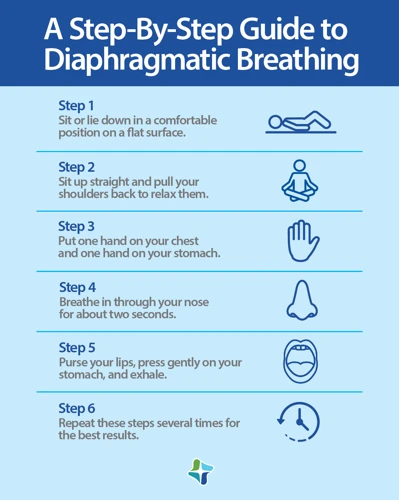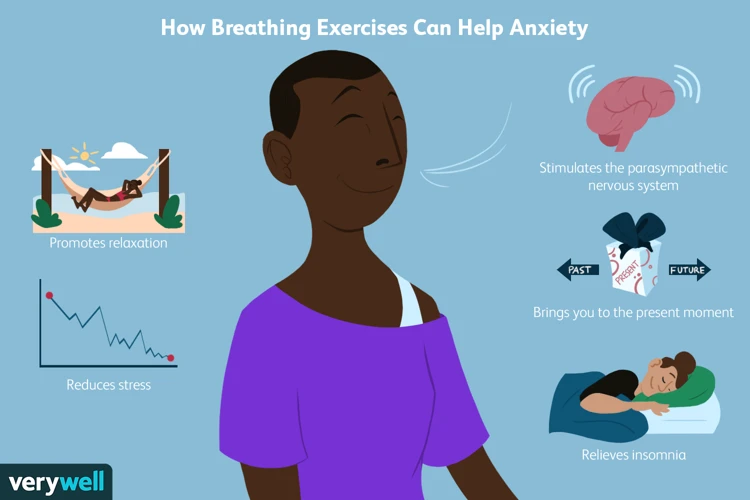Stress and weight gain often go hand-in-hand, and it can be challenging to break this cycle. Many people turn to food to cope with stress, leading to emotional eating and unwanted weight gain. However, there is a simple yet effective solution that can help reduce stress and manage hunger: deep breathing exercises. In this article, we’ll explore the link between stress and weight gain, dive into the science of deep breathing, and provide a step-by-step guide on how to practice deep breathing for stress reduction and weight loss. So, join us as we uncover the power of deep breathing to help you reach your weight loss goals.
What is Stress, and How Does it Affect Your Weight?

We might not always realize it, but stress can have a major impact on our physical and emotional well-being. According to the American Psychological Association, stress is defined as “any uncomfortable emotional experience accompanied by predictable biochemical, physiological and behavioral changes.” While a certain amount of stress is normal and even beneficial in some situations, chronic stress can lead to a number of negative health outcomes, including weight gain. In this section, we’ll explore the relationship between stress and weight, and how stress management techniques like deep breathing exercises can help.
The Effects of Stress on Your Body
Stress can have negative effects on various systems in your body. Here are some ways stress can affect you:
- Increased cortisol levels: Cortisol is known as the stress hormone. When you’re under stress, your body produces more cortisol, which can lead to a range of health problems such as weight gain, high blood pressure, and suppressed immune system.
- Cardiovascular system: Stress can cause your heart rate and blood pressure to increase, and can also contribute to the development of heart disease over time.
- Digestive system: Stress can lead to digestive issues such as indigestion, bloating, and even irritable bowel syndrome (IBS) in some cases.
- Immune system: Chronic stress can weaken your immune system, making it harder for your body to fight off infections and other illnesses.
- Mental health: Prolonged stress can cause anxiety, depression, and other mental health issues.
These are just a few of the many ways stress can affect your body. It’s important to be aware of how stress is impacting you, and take steps to reduce stress whenever possible.
Stress and Emotional Eating
When you’re stressed, do you find yourself reaching for unhealthy snacks or overeating? This is a common response to stress, known as emotional eating. Emotional eating is a coping mechanism that some people use to deal with feelings of stress, anxiety, and sadness. However, emotional eating can lead to weight gain and make it harder to manage your overall health and well-being.
Why do we turn to food when we’re stressed? Research shows that stress can increase the production of the hormone cortisol in our bodies. Cortisol is often referred to as the “stress hormone” because it’s released in response to stress and triggers our “fight or flight” response. When cortisol levels remain high over time, it can lead to an increase in appetite and cravings for high-fat, high-sugar foods.
Emotional eating can lead to a vicious cycle of stress and weight gain. When you eat in response to stress, you may feel temporary relief, but the underlying stress remains. This can lead to feelings of guilt and shame about overeating, which can then trigger more stress, and the cycle continues.
To break this cycle, it’s important to find alternative coping mechanisms for dealing with stress. One effective technique is deep breathing. By practicing deep breathing exercises, you can reduce your stress levels and manage your emotions without turning to food.
How Does Deep Breathing Reduce Stress?

When it comes to reducing stress, there are various methods that individuals turn to. One lesser-known technique that has been gaining popularity in recent years is deep breathing exercises. But how exactly does deep breathing help to reduce stress? In this section, we’ll delve into the science behind deep breathing and its effects on stress.
The Science of Deep Breathing
Deep breathing is based on the scientific principle that when you take deep breaths, you activate your parasympathetic nervous system, which helps your body relax and reduces your stress levels. This can, in turn, improve the function of your body’s organs and systems, bringing various health benefits, including weight loss.
One of the primary benefits of deep breathing is that it increases the flow of oxygen to your brain and body. This increased oxygen supply can help to reduce feelings of anxiety, tension, and stress, as well as clearer thinking and improved concentration. When you feel stressed, your body releases hormones such as cortisol and adrenaline, which can increase your heart rate and blood pressure as well as negatively affecting your metabolism. Deep breathing helps to counteract these effects by reducing the production of stress hormones and decreasing your heart rate and blood pressure.
Deep breathing has also been shown to stimulate the vagus nerve, which controls a number of important functions in your body, including digestion, heart rate, and blood pressure. This is because when you take deep breaths, your diaphragm moves down, which exerts gentle pressure on your vagus nerve, promoting a feeling of relaxation and calmness.
Additionally, practicing deep breathing on a regular basis can encourage the development of gray matter in your brain, which is associated with emotional regulation, self-awareness, and perspective-taking. This can help you to better manage stress, negative emotions, and other challenges that might trigger you to overeat or make unhealthy food choices.
The science of deep breathing demonstrates that this technique is a powerful tool for managing your stress levels, controlling your hunger, and ultimately facilitating weight loss. Incorporating deep breathing exercises into your daily routine can bring a wide range of benefits for your physical and mental wellbeing.
How Deep Breathing Can Help You
Deep breathing can be an effective tool for reducing stress and managing hunger, and it offers several benefits to your overall well-being. Here are a few ways deep breathing can help you:
- Reduces tension and anxiety: Deep breathing helps to calm your mind and reduces overall tension and anxiety in your body. It is a simple yet effective technique that can be used whenever you feel stressed or overwhelmed.
- Increases oxygen flow: During deep breathing, you’re taking in more oxygen and exhaling carbon dioxide, which helps to stimulate your parasympathetic nervous system. This can lead to a feeling of relaxation and calmness.
- Improves digestion: Deep breathing can help to improve digestion by increasing blood flow to the digestive system and promoting overall relaxation. This can aid in the absorption of nutrients and reduce digestive issues such as bloating and constipation.
- Strengthens your immune system: By reducing stress and promoting relaxation, deep breathing can help to strengthen your immune system. This can make you less prone to illness and help your body recover more quickly if you do get sick.
- Boosts energy levels: Deep breathing can help to increase oxygen flow to your brain and other vital organs, which can lead to a boost in energy levels. This can help to reduce fatigue and increase mental clarity.
These are just a few of the ways that deep breathing can benefit your health and well-being. By incorporating deep breathing exercises into your daily routine, you can reduce stress, manage hunger, and improve your overall quality of life.
How to Practice Deep Breathing for Stress Reduction

As stress can have negative effects on both physical and mental health, it’s important to find ways to manage it. One technique that has been proven effective is deep breathing. Not only can it help to reduce stress levels, but it can also aid in weight loss by reducing cravings and emotional eating. But how exactly do you practice deep breathing for stress reduction? In this section, we will provide step-by-step guidance on how to incorporate deep breathing exercises into your daily routine.
1. Find a Comfortable Place to Sit
When practicing deep breathing, it is important to find a comfortable place to sit. This will help you fully relax and focus on your breathing.
Here are some tips for finding a comfortable place to sit:
- Choose a quiet and peaceful spot where you won’t be disturbed
- If possible, sit in a room with natural light or near a window
- Find a chair or cushion that provides good support for your back
- Make sure your feet are flat on the ground and your arms are resting comfortably on your lap or on the arms of the chair
By finding a comfortable place to sit, you will eliminate any physical discomfort that may distract you from your breathing exercises. Remember that the goal is to fully relax and release any tension that may be causing stress. So take the time to find a comfortable place to sit, and you will be on your way to a more peaceful and stress-free life.
2. Get Comfortable and Start Slow
Once you have found a comfortable place to sit, it’s important to get into a comfortable position before starting your deep breathing exercises. This will help you to fully relax and focus on your breathing. To do this, try following the steps below:
| Step 1 | Choose a chair with a supportive back. |
| Step 2 | Sit with your feet flat on the floor. |
| Step 3 | Rest your hands on your thighs or in your lap. |
| Step 4 | Close your eyes or focus on a point in the distance. |
| Step 5 | Take a few deep breaths in and out to settle into your position. |
Starting slow is also important to avoid feeling overwhelmed or anxious. Take a few deep breaths in and out, and slowly increase the length of your inhales and exhales. You don’t need to rush to reach a certain number of breaths or amount of time. The key is to focus on the quality of your breaths, not the quantity. Remember to keep your inhales and exhales even, and take a small pause in between each breath. By getting comfortable and starting slow, you can set yourself up for a successful and rejuvenating deep breathing session.
3. Focus on Your Breathing
Once you have found a comfortable place to sit and have gotten into a comfortable position, it’s time to focus on your breathing. The main goal of deep breathing exercises is to slow down your breathing and become more mindful of each breath you take. Follow these steps to help you stay focused:
- Inhale through your nose: Breathe in slowly through your nose, filling your lungs with air. Count to four as you inhale.
- Hold your breath: Once you have taken a full breath, hold it for a second or two. Count to three as you hold your breath.
- Exhale through your mouth: Slowly exhale all the air out through your mouth. Count to six as you exhale.
- Repeat: Continue inhaling through your nose and exhaling through your mouth in this same pattern. Focus on each breath and become more mindful of your body’s sensations and how they change as you breathe.
Remember to take your time and focus on each breath. Try not to get distracted by any external thoughts or stimuli. Simply observe your breathing and the way your body moves with it. With practice, you will become more comfortable with these exercises and will be able to incorporate them into your daily routine without much effort.
4. Use Guided Meditations or Apps
One of the best ways to practice deep breathing for stress reduction is to use guided meditations or apps. There are many resources available to help you learn and practice deep breathing techniques.
Guided Meditations: Guided meditations are led by an instructor or teacher who directs you through the breathing process. This can be a helpful way to start your deep breathing practice, as you can focus on the teacher’s voice and follow their instructions. There are many guided meditation resources available online or through apps, such as Headspace or Calm.
Deep Breathing Apps: There are also many apps available that are specifically designed to help with deep breathing exercises. Some popular options include Breathe2Relax, Prana Breath, and Breathing Zone. These apps offer guided breathing exercises, visual aids, and reminders to practice throughout the day.
Benefits of Using Guided Meditations and Apps: Using guided meditations or apps can be especially helpful for beginners who are just starting to explore the benefits of deep breathing for stress reduction. It can help you stay focused, and provide structure to your practice. These resources can also offer additional benefits, such as providing a sense of community through online forums, access to expert advice and support, or offering specialized programs for managing specific health conditions.
While guided meditations and apps can be helpful, it’s important to remember that deep breathing is a personal practice and what works for one person may not work for another. It may take some time and experimentation to find the right resources and techniques that work for you. But with patience and persistence, deep breathing can be a powerful tool for reducing stress and managing hunger cravings.
How Deep Breathing Can Help Reduce Hunger and Cravings
When it comes to weight loss, controlling hunger and cravings can be a major obstacle. This is especially true when stress is a common trigger for overeating. However, there is a simple and natural solution that can help reduce both stress and hunger: deep breathing exercises. By understanding the connection between stress and hunger, as well as how deep breathing affects the body’s hunger hormones, you can take control of your eating habits and achieve your weight loss goals.
The Connection Between Hunger and Stress
Stress has a significant impact on our hunger levels and can lead to overeating or emotional eating. When we experience stress, a hormone called cortisol is released into our bloodstream. Cortisol triggers the body to release glucose to provide energy for the fight or flight response, preparing the body for a potential threat. However, in our modern world, the stressors we face are often not physical threats, and the excess glucose that is released can lead to hunger and cravings.
Research has shown that individuals who experience chronic stress may have higher levels of cortisol, which can lead to increased hunger and cravings for high-fat, high-sugar foods. In addition, stress can affect the part of our brain that controls impulses and decision-making, making it more difficult to resist tempting food choices.
Furthermore, stress also affects our sleep patterns, with many individuals experiencing sleep disturbances when under stress. Lack of sleep can increase hunger and cravings for unhealthy foods and can also lead to a decrease in the hormone leptin, which signals satiety, or fullness.
It is essential to find healthy ways to manage stress, such as deep breathing exercises, to reduce the release of cortisol and the impact it has on our hunger levels. By reducing stress, we can also improve our sleep patterns and make better choices when it comes to our food intake.
Deep Breathing and Hunger Hormones
Deep breathing exercises have been shown to have a direct impact on hunger hormones. These hormones, such as ghrelin, leptin, and cortisol, play a key role in regulating hunger and appetite.
Ghrelin: Ghrelin is known as the “hunger hormone” because it stimulates appetite and promotes fat storage. Deep breathing has been found to decrease ghrelin levels, helping to reduce feelings of hunger and prevent overeating.
Leptin: Leptin is a hormone that plays a role in regulating metabolism and appetite. Low levels of leptin can lead to overeating and weight gain, while high levels can suppress appetite. Deep breathing has been shown to increase leptin levels, helping to regulate metabolism and reduce hunger.
Cortisol: Cortisol is a stress hormone that can contribute to weight gain and overeating. Deep breathing has been found to decrease cortisol levels, reducing stress and helping to control appetite.
Deep breathing exercises can help to regulate hunger hormones and reduce feelings of hunger and cravings, making it easier to manage weight and maintain a healthy diet. By practicing deep breathing regularly, individuals can improve their overall health and well-being while also supporting weight loss goals.
The Benefits of Deep Breathing for Weight Loss
Deep breathing exercises can be a powerful tool in promoting weight loss. By reducing stress levels and managing hunger, deep breathing can help individuals make healthier choices, reduce emotional eating, and improve their overall well-being. Here are some of the benefits of incorporating deep breathing exercises into your weight loss journey:
- Reduced stress levels: Stress triggers the release of cortisol, a stress hormone, which can lead to weight gain and difficulty losing weight. Deep breathing exercises can help reduce cortisol levels, leading to less stress and better weight management.
- Improved digestion: Deep breathing exercises can also improve digestion, preventing issues such as bloating and constipation that can hinder weight loss progress.
- Increased mindfulness: By focusing on your breath during deep breathing exercises, you can become more mindful of your body and your emotions. This can help prevent emotional eating and make you more aware of your food choices.
- Better sleep: Poor sleep can disrupt hormone levels, leading to weight gain and difficulty losing weight. Deep breathing exercises can help promote relaxation and better sleep, leading to improved weight management.
- Reduced inflammation: Chronic inflammation can contribute to weight gain and other health issues. Deep breathing exercises have been shown to reduce inflammation in the body, leading to better overall health.
Incorporating deep breathing exercises into your daily routine can be a simple and effective way to promote weight loss and improve your overall health. By reducing stress levels, managing hunger, and improving mindfulness, deep breathing can help individuals make healthier choices and achieve their weight loss goals.
Conclusion
In conclusion, deep breathing is a powerful tool for reducing stress and managing hunger, two of the biggest obstacles to weight loss. By taking a few minutes each day to practice deep breathing exercises, you can lower your stress levels and improve your ability to manage cravings and emotional eating.
Through scientific research, we now understand that deep breathing can activate the parasympathetic nervous system, which helps to reduce stress and calm the body. This, in turn, can help to regulate appetite hormones and reduce feelings of hunger and cravings.
To practice deep breathing, find a quiet, comfortable place to sit and breathe slowly and deeply, focusing on your breath and letting go of any distracting thoughts. You can also use guided meditations or apps to help you learn how to breathe deeply and incorporate this practice into your daily routine.
By reducing stress and managing hunger through deep breathing, you can create a healthier relationship with food and your body. Incorporating this simple but effective practice into your daily routine can not only support weight loss efforts but also improve overall health and well-being. Give it a try and see how deep breathing can benefit you!
Frequently Asked Questions
1. Can deep breathing exercises help me lose weight?
Deep breathing exercises can aid in weight loss by reducing stress levels, which can help control emotional eating and cravings.
2. How often should I practice deep breathing for stress reduction?
It is recommended to practice deep breathing for at least 5-10 minutes a day, but it can be done as often as needed to manage stress levels.
3. Can deep breathing exercises help with anxiety?
Yes, deep breathing exercises have been shown to be effective in reducing anxiety symptoms by promoting relaxation and reducing stress levels.
4. Is it necessary to sit in a specific position while practicing deep breathing?
No, it is not necessary to sit in a specific position while practicing deep breathing. However, it is recommended to sit up straight to allow for easier breathing.
5. Can deep breathing exercises replace regular exercise?
No, deep breathing exercises should not replace regular exercise, but can be used in conjunction with it for better stress and weight management.
6. Are there any risks associated with deep breathing exercises?
Generally, there are no risks associated with deep breathing exercises, but it is important to consult with a healthcare professional if you have any breathing or lung disorders.
7. What is the difference between regular breathing and deep breathing?
Regular breathing is shallow and only fills the lungs partially, while deep breathing involves inhaling and exhaling deeply to completely fill and empty the lungs.
8. Can deep breathing exercises be done before bed to help with sleep?
Yes, deep breathing exercises can be done before bed to promote relaxation and better sleep.
9. Can deep breathing exercises be done while exercising?
Yes, deep breathing exercises can be done while exercising to increase endurance and reduce stress levels during physical activity.
10. How long does it take to see the benefits of deep breathing exercises?
The benefits of deep breathing exercises can be felt immediately, but consistent practice over time can lead to long-term benefits in stress and weight management.







